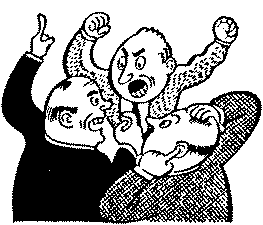Communication is required in some form to understand each other and reality more. Verbally said, visually written, or even body expressions that convey a limited subset of communication potential. Communication gets more powerful with symbols and language.

Source
There is much variability, diversity and multiplicity in reality. It's not just "one thing" like the word universe would imply, where everything is turned into one universally-grouped construct. We create symbols, like pictographs or abstract letters, and join them in sequences to form different groupings in order to define them as a representation of the differences in reality.
In a perfect linguistic construction, the language would have one word for each meaning and reference to something actual or imagined in reality. But, we often use the same word that is either identical in visual written form or verbal auditory form, yet mean different things.
This can add some confusion in communication, such as semantic misunderstandings that result from people having different definitions to the terms used in communicating about something real or imagined. When two people have different building blocks to form a conception about a topic, they end up walking two different paths even though they both think they are talking about the same thing.

Source
The result in not being on the same page or level of understanding in the end. To avoid conflict and misunderstanding, we need to remember that we may need to define our terms in order for clarity to be achieved.
I say anarchy, you hear anarchy. I mean one thing, you understand another.
I say socialism, you hear socialism. I mean one thing, you understand another.
I say X, you hear X. I mean X1, you understand X2.
Why?
Words can mean different things to different people. They are sounds and symbols. We are to use specific sounds and symbols to convey certain meanings. A is A, not B. 'The' is not 'then'. Languages define symbols and sounds so that those who use a language can have a common ground of sounds and symbols that they agree to use for communication. But the meaning defined can vary.
Our words lack precision often. Layers of meaning and even opposite meanings can be applied to one single word. It can get confusing in itself to study the meaning of words and the etymological roots to their origins.
When growing up and learning about things, we often adopt meanings others impose upon us, unless we dig deeper ourselves to verify the meaning. There are conventional or colloquial meanings that apply in a society or region. Someone else using the same word can be talking about a different, or more accurate, understanding compared to how another understands a word.
Language and definition is seen as a problem for some because we don't establish precise terms, don't define our terms when confusion arises, and then we can't communicate what we want to share, foolishly blaming language instead of ourselves for not properly using the tool. Laziness to define terms, or ignorance of it's importance, is what keeps many people from understanding more about each other or the reality before us.
When arguments develop over a proposition, the premises need to be looked at, but also the building blocks of those premises which include the definition of words used. Ask someone to define a word, or define the word yourself, and see if everyone in the discussion is on the same page. Then progress in an argument can be made where we arrive at greater understanding of reality, together.
Truth takes time. Understanding reality takes time to learn. Communicating about what we understanding takes even more time. Establishing a common ground of definitions is required in order to talk about the same thing. Otherwise if words and definitions meant whatever we wanted them to mean, you could say orange, and I think apple, human, or anything else. Definitions are required to communicate effectively.
Thank you for your time and attention. Peace.
If you appreciate and value the content, please consider: Upvoting, Sharing or Reblogging below.
 me for more content to come!
me for more content to come!
My goal is to share knowledge, truth and moral understanding in order to help change the world for the better. If you appreciate and value what I do, please consider supporting me as a Steem Witness by voting for me at the bottom of the Witness page.


On top of which the English language — which is NOT my native tongue — is exceptionally complex. There are so many look-alikes and sound-alikes that require paying extra attention to meanings and subtle subtexts.
Danish is hard to learn (from a grammar/pronounciation) perspective, but easier in the sense that the language is filled with compound words, which tend to be more "descriptive," which leads to less confusion. We don't have "wardrobes," "cupboards" and whatever else you might call a contained space... we have "clothes cabinets" and "plate cabinets" and so forth.
Language is fascinating!
Yes it is fascinating. That's interesting about cabinets for each type of item hehe.
Well put and a great reminder that we should remember these things before we react emotionally on what may just be a difference in our understandings of language nuances.
Yup, it's easy to be on different paths with the same words ;)
You had reminded me the story of the tower of Babel in the bible when people can't communicate they can kill each other.
Yeah, that's good symbolism, thanks ;)
Hello bro upvote and resteemid done 👍
its very great post about communication